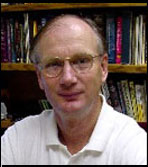
Tom Shetler is Professor of Biblical Studies and Apologetics in Bethany College of Missions, Minneapolis. He also serves as the Community Life Director of Bethany Fellowship International, a missions-oriented community that established and runs the renowned Bethany House Publishers, Bethany Fellowship Missions, Bethany Press International, Bethany Urban Development, and Bethany College of Missions.
BOOKS FOR YOU TO READ
AND DOWNLOAD
- LUTHER'S PROTEST by M. S. Thirumalai
- TELL ME IT'S TRUE ...
A Book Of Poems by Stan Schmidt - SOMETHING IS GREATER THAN WONDERS...
A Book Of Poems & Free Verses by Pastor Harold Brokke - GEMS OF TRUTH by Stan Schmidt
- WHERE IN THE WORLD IS GOD? by Alec Brooks
- LIGHT OF THE WORLD, an Original Screenplay by W. G. Orr
BACK ISSUES
SEND YOUR ARTICLES FOR PUBLICATION IN Christian Literature Today.
- E-mail your articles and book-length reports to thirumalai@bethfel.org or send it by regular mail to:
M. S. Thirumalai, Ph.D.
6820 Auto Club Road #320
Bloomington, MN 55438 USA - Your articles and booklength reports should be written, preferably, following the MLA Stylesheet.
- The Editorial Board has the right to accept, reject, or suggest modifications to the articles submitted for publication, and to make suitable stylistic adjustments. High quality, academic integrity, ethics, and morals are expected from the authors and discussants.
Copyright © 2001
M. S. Thirumalai
THE OPENNESS OF GOD AND CREATIVE WRITING
Tom Shetler

1. WHAT WOULD CHRISTIAN LITERATURE BE LIKE IF GOD IS ALOOF FROM US?
Is God accessible to us? Or is He aloof from us, sitting in His throne in the heavens, and simply judging us for what we do or not do, without guiding us when we seek Him? Does He suffer with us even as He lifts us from mire? What would be Christian literature like if God were to be always aloof, stern, and judgmental, never stooping "low" to help us? One basic truth we all learn from the Word of God is that "you will find him if you look for him with all your heart and with all your soul … For the Lord your God is a merciful God; he will not abandon or destroy you or forget the covenant …" (Deuteronomy 4:30-31). Jesus said, "My Father is always at his work to this very day, and I, too, am working" (John 5:17). The Bible does not describe a disengaged, passionless God.
2. AN INTERESTING CONTROVERSY: OPENNESS OF GOD
There is an interesting controversy raging now between well-meaning servants of God who view the role and nature of God in somewhat different terms. The renewed understanding of God's role, nature and function in His created world and with His creation is termed the Openness of God. It is a renewed look at God just as the theology of grace that inaugurated the Reformation was a renewed outlook at that time. The creative writers of Christian literature have always banked upon the accessibility of God in diverse ways in telling their stories, delineating the characters, storyline and events. God speaks and acts through His creation for the benefit of those who seek Him. The ordinary people always prayed to God, hoping that their prayers would be answered, that their sins would not only be pardoned but wholly forgotten, and that their Lord is always listening and helping them, even as He has given them the freewill to act, do or undo.
3. WHY THE OPEN VIEW OF GOD?

The open view of God arose from three concerns. First, the concern that classical theism (the current term for traditional Protestant theology) was founded not upon Biblical descriptions of God, but upon Greek philosophical definitions. Thus, classical theism speaks of God's immutability (not capable of or susceptible to change), impassability (incapable of feeling), and non-temporality (eternity, not relating to time). These categories were taken from Augustine, who took them from Plato. The concern of those who support the Openness of God is that these definitions were taken from the attempts of the Greek philosophers who did not have a true understanding of who God is. The Greek philosophers created a view of God in these terms in direct opposition to the condition of the natural (material) world. The natural world is subject to change (and decay), so God must be, by definition, unchanging. The world is full of passion and fury; so God must be impassable. The world is subject to time; so God must stand beyond time. In so doing, the Greeks created a view of God that becomes ultimately impersonal and monistic (only one ultimate reality, so both evil and good must emanate from the same source). These definitions were passed from theologian to theologian since the time of Augustine. While the Word of God clearly showed that God is at work in history, and is always at hand feeling for us and participating in our lives, these theological notions began to dominate the thinking in the Church. The real appreciation of who God is and how He is willing to reveal Himself to us and is willing to be moved by our prayers and our seeking Him is somewhat blunted.
4. CRITICISM AGAINST THE OPEN VIEW OF GOD
One of the criticisms of Openness of God or neotheism is that it is only a recent invention, it has no ancient proponents in the same way that the theology of freewill and the personal responsibility of man has. Neotheism has no counterpart to Pelagius or Arminius, thus it is accused of being a novelty of our relativistic and postmodern age.
5. ARGUMENTS IN FAVOR OF THE OPENNESS OF GOD
This view is not entirely true. Greg Boyd has argued forcefully that neotheism is really a modern version of Molinism (or Middle Knowledge in regard to foreknowledge and predestination) that arose with Arminianism. In addition, several writers in the last 50 years have questioned the classical view of omniscience. Books such as Did God Know? and writers such as Richard Forester raised these questions long before Greg Boyd or John Sanders did.
The basic question is if the traditional views of God are truly Biblical. God is personal, He interacts with His creation and His creatures, He shows grief (Gen. 6), He is surprised and pleased (I Kings 21:29), He is surprised and displeased (Isaiah 5:4), He relents concerning judgment (Jonah 3:10), He speaks conditionally (if…, then…) expecting men to heed the warning and act accordingly. He must continually adjust His plan to the resistance, reluctance, and disobedience of men.
Classical theism has for a very long time, considered these examples to be anthropomorphisms (an interpretation of what is not human or personal in terms of human or personal characteristics). By assuming this posture, the classical theists are, therefore, making Biblical descriptions secondary to philosophical definitions. In other words, they employ philosophy to judge (and interpret) scripture and not the other way around.
The second major issue that inspired the open view was the implications that classical theism provided for God's involvement in history (and thus in our world). Classical theism implied that God is distant and disengaged. His actions and reactions are anthropomorphic and thus staged for our benefit, but that history and our destiny are predetermined, and we are only actors living out the lines that were pre-written for us in the drama of history. It describes a God who is only pretending to be moved by our sin and our need. In short, it presents a God who seems very different from the God who wept over Jerusalem, and so loved the world that He willingly entered human history to rescue us. This objection is expressed eloquently in Clark Pinnock's recent book, Most Moved Mover.
6. AN ILLEGITIMATE VIEW?
The supporters of classical theism view this as two illegitimate forms of argument, the appeal to emotion and sentiment rather than reason and the reduction of God to possessing human limitations (attributes). But this issue lies at the very heart of the matter. Is God personal or not? The Bible is clear, He is personal, and we as persons, share the attributes of personhood with Him. The fact that God speaks, experiences joy and grief, enters into real personal relationships, acts and reacts are because He is a person, it does not mean that He has human limitations. Open theism or the Openness of God view is attempting to restore this sense of the personal in God. He is not unmoved by our sin and suffering, anymore than we as persons are unmoved by the sin and suffering of our world. He is the great relational God, and He calls us to a personal relationship with Him (and to value relationship on the human level too).
7. PROBLEM OF EVIL
The third and final concern that led to open theism is the issue of the problem of evil. Greg Boyd's God at War is probably the most thorough expression of this concern. God is not the hidden source of all that occurs, because so much of what occurs is evil. God is as opposed to injustice, suffering, and oppression as we are. In fact, we hate evil because God hates it first. We build hospitals and orphanages because God is opposed to sickness, abandonment, suffering, and death. Francis Schaeffer has argued, in fact, that this is the great philosophical distinctive of Christianity. We can fight sin and evil, because they are contradictions of the will of God - tragic mistakes and rebellions against the goodness of God - as opposed to being part of structure and nature of the universe. Hindus do not fight poverty; it is a product of "karma," the judicial structure of the universe. Muslims do not oppose disease and disaster; it is inshalla, the will of Allah.
8. A HERESY?
The outcry against the open view has been intense. Many of leaders and participants at the recent ETS (the Evangelical Theological Society) national convention labeled it "heresy." It was, by vote of the members of ETS, declared outside the boundaries of acceptable evangelical Christian theology. It seems that many of the participants were strongly influenced by the objections of two men, Bruce Ware and Norman Geisler. If I can summarize, their argument against open theism is:
- If neotheism (openness of God view) is true, then predictive prophecy is fallible. In other words, God's prophetic promises may not be sure things. I don't think this is what the open view is saying at all. One of the key issues for Greg Boyd is the term infinite intelligence, used to describe God. God's will is sure because of the character and intelligence of God, He will bring it to pass. No neotheist denies the great prophetic promises of Scripture.
- If neotheism is true, then the Bible is not infallible. This accusation flows from the first allegation. If prophecies aren't certain, the Bible isn't certain, etc. No neotheist denies the inerrancy or infallibility of scripture.
- Neotheism undermines God's unconditional promises. This is built upon allegation #1.
- If neotheism is true, we can have no assurance of salvation. This objection rises from #3 and added to it will be drastic accusations about God not answering prayer, being able to have the final victory over evil, etc.
- Neotheism is actually the worship of a finite and false God, and thus it is a form of idolatry and heresy. Bruce Ware uses Isaiah 42 as the "nail in the coffin" for neotheism. Because an idol cannot predict the future it is false, thus God must know the future, and a view of God that denies His perfect foreknowledge is false. Neotheists are certainly aware of Isaiah 42; Greg Boyd and John Sanders have spoken to it: Greg, by appealing to His infinite intelligence and ability to act sovereignly and powerfully in human history.
9. CREATIVE WRITERS AND THE OPENNESS OF GOD
As I struggled with these questions at the ETS conference last fall, I felt and still feel that the question, "Is open theism a legitimate evangelical option?" should be answered with a "yes." It seems to me that just as the question of predestination vs. freewill stand as legitimate options because there are specific portions of scripture that can be used to support those positions, so this question of foreknowledge has scripture on both sides of the issue. God can say to Abraham, "Now I know..." and He can say to Peter, "Before the cock crows, you will deny me three times."
My concern is that the church is missing an historic opportunity to examine the foundations of its theology. Open theism raises an important question, one that is long overdue in being examined. Is our understanding of God derived from scripture or from philosophy? Or how much of our understanding of God is derived from philosophy and how much from scripture? To declare open theism heresy is to close the discussion, but it is also to leave unquestioned the presuppositions of our theology. My own feelings are that this discussion is long overdue.
Meanwhile the creative writers of Christian literature will continue to focus on the willingness of our Lord to come to the help of his creation when they seek him. They know intuitively that the Lord is always at hand for their characters if only they seek him. They would rather focus on a God who is willing to help than on a God who is always aloof and judgmental. They know that there are things that the humans could not figure out for themselves, but God can. They would focus more on the persistent widow (Luke 18:1-6) and will declare with one voice: "And will not God bring about justice for his chosen ones, who cry out to him day and night? Will he keep putting them off?" (Luke 18:7).
ENEMY OCCUPATION | THE OPENNESS OF GOD AND CREATIVE WRITING | LUTHER'S PROTEST | ABANDON AND OTHER POEMS | WHO'S IN CONTROL, YOU OR CHRIST? | MONTE CRISTO AND SALVATION FROM END TO BEGINNING | THE SPIRIT OF JANETTE OKE'S NOVELS | HOME PAGE | CONTACT EDITOR
Tom Shetler
Bethany College of Missions
6820 Auto Club Road, Suite C
Bloomington, MN 55438, USA
E-mail: tom.shetler@bethfel.org.